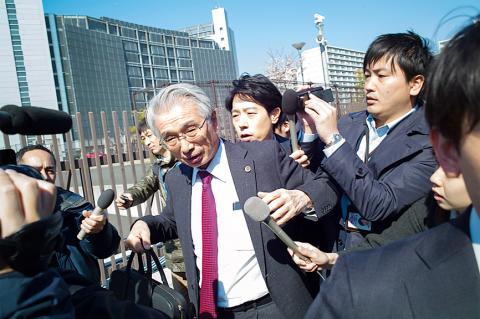Former Nissan Motor Co chairman Carlos Ghosn was rearrested yesterday in Tokyo on fresh financial misconduct allegations, with the auto tycoon calling his detention “outrageous and arbitrary.”
Authorities arrested the 65-year-old less than a month after he was freed on bail following more than 100 days in detention, the latest twist in a case that has gripped Japan and the business world since November last year.
Ghosn was detained at the central Tokyo apartment he has called home since his release on bail, with local media later reporting he had been transferred to the Kosuge detention center.

Photo: Bloomberg
“Why arrest me except to try to break me? I will not be broken,” Ghosn said in a statement issued through his representatives. “My arrest this morning is outrageous and arbitrary.”
Prosecutors said Ghosn had been detained over transfers of Nissan funds totaling US$15 million between late 2015 and the middle of last year.
They suspect that US$5 million of that amount was used by Ghosn for personal expenditure.
“The suspect ... was responsible for overseeing the whole of Nissan’s operations and performing his duty loyally so as not to cause losses to Nissan, but he betrayed that duty in order to benefit himself,” prosecutors said in a statement.
Ghosn’s lawyer told reporters that prosecutors were engaging in “hostage justice.”
“It’s extremely unfair,” Junichiro Hironaka told local media.
Reports emerged this week that Japanese prosecutors were investigating transfers by Ghosn of more than US$30 million of Nissan funds from 2012.
That came after news that Renault SA, which Ghosn also once headed, had handed French prosecutors documents showing the auto tycoon had authorized suspicious transfers worth millions of euros.
The former high-flying executive already faces three charges in Japan of financial misconduct related to allegations he under-reported his compensation and sought to transfer personal investment losses to Nissan’s books.
He has denied any wrongdoing and took to Twitter for the first time on Wednesday to announce plans to “tell the truth” at a news conference on Friday next week.
His arrest makes that event unlikely.
Prosecutors can hold Ghosn for up to 22 days while they investigate the new claims before he can seek bail again.
A Nissan spokesman said the firm’s internal probe had uncovered “substantial evidence of blatantly unethical conduct” and that their focus was on “addressing weaknesses in governance that enabled this misconduct.”
Ghosn faces two separate charges of deferring his salary to the tune of ¥9 billion (US$81 million) and not revealing this in official documents to shareholders.
The Brazil-born pioneer of the auto sector also faces a charge of seeking to shift personal investment losses onto Nissan’s books and then using company funds to pay a Saudi Arabian associate who stumped up collateral for him.

ISSUES: Gogoro has been struggling with ballooning losses and was recently embroiled in alleged subsidy fraud, using Chinese-made components instead of locally made parts Gogoro Inc (睿能創意), the nation’s biggest electric scooter maker, yesterday said that its chairman and CEO Horace Luke (陸學森) has resigned amid chronic losses and probes into the company’s alleged involvement in subsidy fraud. The board of directors nominated Reuntex Group (潤泰集團) general counsel Tamon Tseng (曾夢達) as the company’s new chairman, Gogoro said in a statement. Ruentex is Gogoro’s biggest stakeholder. Gogoro Taiwan general manager Henry Chiang (姜家煒) is to serve as acting CEO during the interim period, the statement said. Luke’s departure came as a bombshell yesterday. As a company founder, he has played a key role in pushing for the

China has claimed a breakthrough in developing homegrown chipmaking equipment, an important step in overcoming US sanctions designed to thwart Beijing’s semiconductor goals. State-linked organizations are advised to use a new laser-based immersion lithography machine with a resolution of 65 nanometers or better, the Chinese Ministry of Industry and Information Technology (MIIT) said in an announcement this month. Although the note does not specify the supplier, the spec marks a significant step up from the previous most advanced indigenous equipment — developed by Shanghai Micro Electronics Equipment Group Co (SMEE, 上海微電子) — which stood at about 90 nanometers. MIIT’s claimed advances last

EUROPE ON HOLD: Among a flurry of announcements, Intel said it would postpone new factories in Germany and Poland, but remains committed to its US expansion Intel Corp chief executive officer Pat Gelsinger has landed Amazon.com Inc’s Amazon Web Services (AWS) as a customer for the company’s manufacturing business, potentially bringing work to new plants under construction in the US and boosting his efforts to turn around the embattled chipmaker. Intel and AWS are to coinvest in a custom semiconductor for artificial intelligence computing — what is known as a fabric chip — in a “multiyear, multibillion-dollar framework,” Intel said in a statement on Monday. The work would rely on Intel’s 18A process, an advanced chipmaking technology. Intel shares rose more than 8 percent in late trading after the

GLOBAL ECONOMY: Policymakers have a choice of a small 25 basis-point cut or a bold cut of 50 basis points, which would help the labor market, but might reignite inflation The US Federal Reserve is gearing up to announce its first interest rate cut in more than four years on Wednesday, with policymakers expected to debate how big a move to make less than two months before the US presidential election. Senior officials at the US central bank including Fed Chairman Jerome Powell have in recent weeks indicated that a rate cut is coming this month, as inflation eases toward the bank’s long-term target of two percent, and the labor market continues to cool. The Fed, which has a dual mandate from the US Congress to act independently to ensure